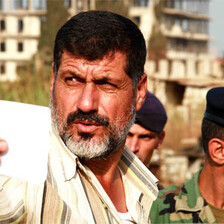Electronic Lebanon 4 June 2007

Baddawi camp, 10km from Nahr al-Bared, is overcrowded with thousands of displaced people. (Hugh Macleod/IRIN)
Since 20 May the Lebanese army has laid siege to the camp after Islamist militants from a relatively unknown group called Fatah al-Islam killed dozens of its soldiers. The army has intensified its bombardment of the camp since 1 June, describing its actions as the “beginning of the end”.
Richard Cook, UNRWA’s director in Lebanon, said the $12.7m was an assessment of the cost of delivering assistance to the displaced over the coming 90 days. He highlighted the “unsustainable” situation in neighbouring Baddawi camp, 10km from Nahr al-Bared, where over 20,000 people have fled.
The appeal includes plans for food aid, shelter, emergency health, water and sanitation, security, and provisions to enable refugee pupils affected by the crisis to sit public exams.
“The overall objective of the appeal is to meet the immediate life-saving needs of the displaced refugees and to provide immediate and short-term support to ensure a safe return to Nahr al-Bared camp as soon as circumstances allow,” Cook told a press conference at UNRWA headquarters in Beirut.
Search for new refugee site
The UNRWA director confirmed the agency was looking for free land with adequate sanitation facilities on which to erect temporary accommodation to ease the massive overcrowding in Baddawi, where the population of the camp has more than doubled since the start of the crisis.
He acknowledged the difficulty of moving already displaced Palestinian refugees into temporary accommodation.
“It is a very sensitive issue for the refugees. Clearly many question, ‘Is this the start of another camp?’ and so we have to be very careful,” Cook told IRIN. “I take this opportunity to confirm UNRWA has no intention of moving the displaced Palestinians into temporary accommodation other than for their own well-being for a temporary period until they can return to Nahr al-Bared.”
A recreational site on the edge of Baddawi that had been a contender for UNRWA’s temporary accommodation has already been rejected by Beddawi’s community leaders.
In the meantime, the government has made four schools in the Baddawi area available for displaced families and the newly enlarged UNRWA school in Baddawi camp itself is also due to be opened to the displaced.
The four-day intense bombardment of Nahr al-Bared eased on Monday afternoon (4 June) as the army brought in reinforcements of at least two dozen armoured personnel carriers and scores more troops in an effort to tighten its grip around the edge of the camp.
Southern checkpoint attacked
The violence in the north spread to a second Palestinian camp on Sunday night when gunmen from the Islamist group Jund as-Sham — Soldiers of the Levant — attacked an army checkpoint outside Ain al-Helweh camp near the southern port city of Sidon. A second attack on Monday left two Lebanese soldiers and two militants dead, and prompted at least 500 Lebanese and Palestinians to flee the camp.
The International Committee of the Red Cross (ICRC) said it had provided five tonnes of food aid, 150 hygiene kits and 500 blankets to 250 displaced families sheltering in a municipal building in Sidon.
Nahr al-Bared aid delivery problems
UNRWA has been unable to enter Nahr al-Bared camp since 22 May when its aid convoy came under attack.
The ICRC has also been unable to deliver vital supplies of food and water into the camp, where up to 8,000 people remain caught in the fighting, since last Thursday. The camp has been without mains electricity since 20 May.
More on Nahr al-Bared
The Palestine Red Crescent (PRC) on Sunday evacuated 19 people from Nahr al-Bared, including one wounded, 11 women, two children and two elderly. Today the PRC evacuated at least nine people, one wounded and the rest women, children and the elderly.
UNWRA compound unusable?
UNRWA is concerned its compound along the northwestern shoreline of the camp may have sustained damage and be unusable in the short term as a base from which to coordinate relief efforts once access to the camp is possible.
The agency told IRIN it had unconfirmed reports that Fatah al-Islam militants had overrun the UNRWA compound.
UNRWA also expressed concern that large areas of the camp, including its compound, could be either booby trapped or contaminated with unexploded ordnance, promising further danger and difficulty for those returning to the camp.
This item comes to you via IRIN, a UN humanitarian news and information service, but may not necessarily reflect the views of the United Nations or its agencies. All IRIN material may be reposted or reprinted free-of-charge; refer to the copyright page for conditions of use. IRIN is a project of the UN Office for the Coordination of Humanitarian Affairs.
Related Links


